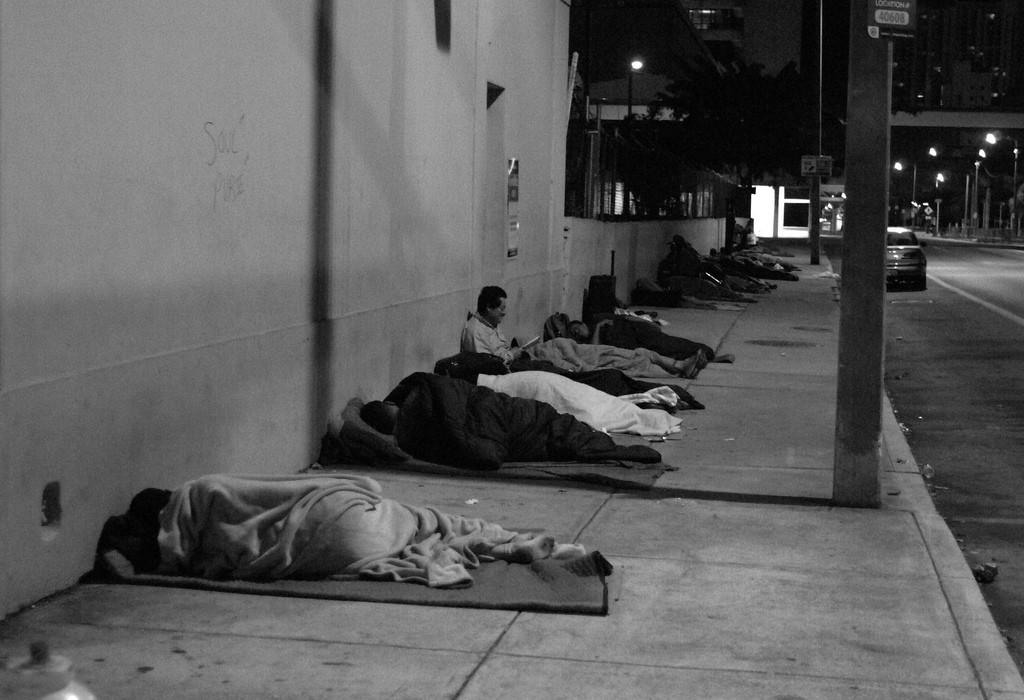

It was an interesting discussion late on Tuesday night as the council got an update on homeless services. The upshot of Homeless Services Coordinator Ryan Collins’ presentation was that relatively modest programs have started to make a difference in terms of providing homeless people with services and getting them off the streets.
There was a long list of people who work or volunteer assisting the homeless who seem optimistic that progress is being made. But Alan Miller, a community member, remarked, “I really feel like a lot of homeless people are beyond our help.”
He said, “I don’t think you can house, that don’t want to be housed. I don’t feel you can help those who are drug addicted, who don’t want to get help.” He added, “It’s really difficult to help those who even want to get the help.”
He added, “Sometimes, when you provide resources, you get more homeless people.” He said he’s not the only person in Davis who feels that way and “I’m not saying do not help those people.”
He added, “What I am saying is let’s put the resources to those people who really are in economic straits and who have mental health issues, and we have to draw the line and the people who are just crazy and walking around on meth, we can’t help them. We have to put our resources for those who really want help and those who really need help.”
What was interesting to me was contrasting that with the comments of a woman named Jessica – I recognized her as someone that I used to see on the streets all the time, but haven’t in a while. Why? She got services from the city and Ryan Collins and was able to get off the streets.
“I’m one of the people who doesn’t necessarily have a support system,” she explained. So when things went wrong and the economy went south, she ended up on the streets in November 2011. “Ryan got to us somewhere around October 2017.”
An ex-drug addict, she described, “I somehow stayed clean by continuing to try to re-invent myself while staying on the streets.” She said, “By September 7, 2018, we were no longer homeless.
“I think that Ryan has done a whole lot in getting us there,” she said.
The contrast here is rather stark. What I read from the report and saw at the meeting on Tuesday provides us with some hope, with some very modest efforts and small expenditures showing some promise of getting homeless people off the streets.
You can argue that maybe we are attacking low-hanging fruit, maybe the efforts and results will be modest, but it seems that step one is to take those modest steps.
I am reminded of a story that Delaine Eastin told in a speech she gave way back in 1994 when she ran for Superintendent of Public Instruction. There was a beach full of starfish that had washed up on shore and a young person started throwing them back into the water in an effort to save them.
Someone came along and told him that his actions were fruitless and that he could never save them all, he could not possibly make a difference.
He picked up another starfish and tossed it into the water and said, “I made a difference to that one.”
Former Mayor Robb Davis lamented this as well, with the comment about the “ghettoization” at Pacifico, and wrote on his person blog, “In the room sat two of the irredeemables, apparently now redeemed. But would the speaker have eliminated them from the ‘largesse’ of the community back then when they were ensconced in the downtown with no hope? One wonders.”
Robb Davis pushed back noting, “The majority of homeless people in town are ‘our children.’”
He said, “Homeless people don’t come here for services (except perhaps a bed in the coldest months – but even that appears to be waning). They come here for the same reason everyone else does: jobs, family, education.”
What I wonder is how you even operationalize the comment of picking and choosing whom you try to help. Do you simply throw your hands up at the problem (as one person would have in the starfish analogy) or do you do the best with limited resources to help those people that you can?
And what do you do for the rest? Leave them on the streets? Throw them in jail? Remove them from town? (The latter two are not only inadvisable, but also not legal).
The remarkable thing again about these comments is that the city is finally putting small numbers of resources in to address the homeless problem, which has been not only intractable but dealt with by a combination of faith-based volunteer and non-profit efforts – and ineffectively by the state and county, and is now starting to get at least preliminarily modestly successful results.
Jessica suggested that we need three of Ryan Collins – perhaps that is the approach we ought to take rather than throwing up our hands and conceding that we cannot help everyone.
—David M. Greenwald reporting







It might be a useful time to review the principle of Triage:
Triage (/ˈtriːɑːʒ, triˈɑːʒ/) is the process of determining the priority of patients’ treatments based on the severity of their condition. This rations patient treatment efficiently when resources are insufficient for all to be treated immediately. The term comes from the French verb trier, meaning to separate, sift or select.[1] Triage may result in determining the order and priority of emergency treatment, the order and priority of emergency transport, or the transport destination for the patient.
Several of the people who post seem to be resistant to this concept and instead prefer to allocate scarce resources to the “greatest need” regardless of whether those resources are likely to help them. If, instead of providing a “meth hotel” for people to use drugs in, we had a recovery house that serviced both housed and unhoused people we could have more Jessicas and fewer pissed off neighbors.
This approach would save lives even if it made it less likely that city and county politicos would get a mention in The Intercept or the Daily Kos. I think that is an acceptable trade-off.
I would have called this article “Elitism is Alive and Well in Davis”
You could have headlined your comment “343th useless post”. Lead by example Craig.
Thanks, CR.
I’m calling your comment, “Unicornism is alive and well in Davis”.
As far as helping others, I am firmly in the “I made a difference to that one” camp. I often hear the critique of social programs “we cannot save them all”. This is true, but too often is used as an excuse for “therefore I will do nothing”.
Jim makes an interesting comment about triage. We tend to see triage as one way. A professional makes a decision about who can be saved and who cannot. However, triage is more complex. The other side of triage is performed by the individual when they take a minor step in terms of reaching out, or even just being receptive to help. The individual in need must show some sign of receptiveness and the “rescuer” must notice. Since the signs are sometimes very subtle, it often takes a very astute observer and many interactions for the timing to be right for both.
Sometimes you don’t even know your “intervention” has helped. Jessica’s story reminded me of one from my clinic years ago. While standing in the grocery line, a well-groomed soccer momish looking woman with child in cart, looked back at me with a huge smile. I gave a smile back and she said “you don’t recognize me do you?” It was true. She laughed and said “I’m not surprised. You saved my life.”I was drawing a blank thinking maybe some near catastrophe on L&D, but no, she said “You told me I was killing myself.” I flashed back several years to a dirty, skin crusted, teeth rotting meth-addicted woman in my clinic to whom I had indeed been just that frank. I had told her that if she continued, her kids were not going to have her growing up. She went home, thought about it, and cleaned it up. Not just the meth….her entire life. 5 minutes of my time. Her future.
We will not save them all. 5 minutes is no panacea. But each “starfish” has its own story and trajectory. We may never know who we have helped. We will only continue to “see” those still on the shore. The ones we have truly helped become invisible in our community just as surely as if we had thrown them in the waves. That should never mean that we do not take that next small step for the next one.
You raise a lot of good points here Tia. A critical point that Ryan Collins made last week and Robb has often made is the importance of establishing relationships with people in need of help so that they are receptive and know where to go when they are ready to take that step. That was the key for Jessica – she had a relationship with Ryan, she trusted him, and when she was ready, she had that trust to take the leap with him.
I agree with this.
On what planet does this not sync with what I said at public comment?
I agree with this.
However, if I encounter hundreds of people in the water from a wreck and some of the people don’t grab onto the rope, my suggestion is save first those who grab on, and don’t keep throwing a rope to the ones that don’t grab on, and don’t get a life raft and go in trying to save the people who don’t grab on, keep throwing the rope to those that grab on. Once there’s no one left but those that won’t grab on, then lower the life raft in and do what you can for the rest, unless they try to pull you into the sea with them — at that juncture shoot them with a harpoon.
As for starfish — the problem is starfish just are, they don’t decide stuff. If you have a team to save a beach full of starfish that do have free will, and you can save 2000 starfish before the sun sets, and some of the starfish have free will and are holding a syringe of meth in one of their five arms and injecting it into one of their their other five arms and covering it with a long sleeve, I would instruct the team to choose 2000 of the starfish that aren’t holding a meth syringe. But that’s just me.
Yes. True story. There is a point where you need to disengage, even if you still care. Not to disengage at that point, might mean a second life gets messed up.
Another way of looking at those who are not ready/willing/able to accept help for change…
In medical parlance, when a patient is dying (as many of the homeless, are, at various rates-very slowly, to imminent), there is “palliative care”… knowing there is no cure, but trying to minimize ‘suffering’…
Let’s consider more resources/commitment towards those ready/willing/able to turn things around, and some resources towards palliative care for those not ready/willing/able…
Let us change the things we can, accept the things we can’t change, and find the wisdom to know the difference… with compassion.
Really good point Bill. I also wonder exactly what Alan Miller suggests we do with people who we can’t help. That’s the part missing from his diatribe. He can talk about unicorns, but he has not put forward a workable plan himself.
You are correct, I have not put forward a workable plan.
It’s a rhetorical exercise. If “we can’t help” then our our only options are to ignore them or hurt them. Which do you prefer.
Actually, I don’t see Alan’s comments being a ‘diatribe’… I worked with a homeless guy for 12 weeks (at his request, which I felt was sincere)… thought I was seeing the ‘victory tape’… was wrong… he wasn’t ‘there’ yet, even tho’ he professed he was… homeless, some SS/SSA resources, alcoholic, some MJ use, depressed (off/on), early memory “issues” (early onset? Appeared to be unrelated to sobriety)…
This issue goes beyond “rocket science”…
But the fact is, the homeless in Davis are to a certain extent, a “community”… they helped me find “M”, when I came to take him to appointments, etc. Never felt unsafe, even when one guy was telling me of Gov’t sending radio waves into his brain… was ready to defend myself, or run like hell, whichever seemed appropriate… still do… all the ones (homeless) I’ve met (2 dozen in last 2 years) are OK with me, or will ‘buzz off’ if I disengage… haven’t found a single one who would be a ‘danger’, except perhaps, to themselves.
Several of them I engaged in lengthy conversations with, and coming away, I wondered “how the hell did this come to pass?”
They are not scary people, if you approach them in a friendly manner… we should not give them money… that feeds into some of their problems… but I believe we should support their efforts, however tentative, to change, and provide basic sustenance.
But, even if confronted with a snarling dog, obviously injured, hungry, I’d take the risk of helping it… eyes wide open, ready to defend myself.
I do not pretend to know “answers”… I do assert that if someone gets to know them, approaching them as you would a new neighbor, they would not be so much a “them”… that has been my experience.
WM, this is generally true, and ludicrous as you have stated it, because as has been stated and agreed to by persons on all sides of the issue, the homeless are made up of many disperate factions with a thousand shades of grey.
I have shared here many times the story my conversation with officer the late officer John (who many remember as the ‘strict but fair’ bicycle cop downtown for many, many years). I was at the Amtrak station and he was relating to me of a group of homeless on the benches nearby. He knew each one by name and their rap sheets, which he listed in detail. Not scary people? Hardly.
There were then, as now, many who would have you believe that because most are ‘harmless’, that all are harmless. His words to me on that particular group were: “Don’t be fooled, these are not good people.”
“Don’t be fooled, these are not good people.” Better to say they are very “unstable” people due to mental illness or drug use. There was a guy named Andrew around for awhile. Sometimes you could talk to him and some days he was running around with black paint on his face and it was better to steer clear.
The more important point is that the homeless have many of the same problem the housed do, substance abuse and mental illness. My suggestion is to pick on and make services available to both populations.
Agree, JH. As it was a group that was there often and I walked by that bench every day, he was conveying the information to give me a what’s real. I had heard a lot of the new philosophy and was beginning to doubt my instincts – he was basically saying ‘trust your instincts’.
I have a question:
If you forget about what we (or you) want to do about a homeless person, and ask them what they want (what their wishes are), what would they say?
As long as what they want is not hurting anyone else and whoever provides help is okay with it, then everything is good, right?
So if a homeless person says they want to quit meth then you show they the way. If they say they want a home and feel safe then you show them somewhere safe. If they want more meth then (if using method is illegal) you put them in jail and let them use meth (?) (What does the police do with confiscated drugs anyway?)
So, what do THEY want?
That’s the wrong question. The problem is if you talk to one homeless person, you’ve talked to one homeless person. Each person is different, their situation is different, their needs are different. However, finding services and shelter I think in general are important goals.
That was meant to be a singular they. Or a plural they with implying that since each is different, ask each of them what they want. So I think we are talking about the same thing.
Craig… you and Edgar are talking same things, I think…
I don’t give money… have often offered, and bought them, a meal … usually eat with them… one time, I offered that to someone, and he said “no, I just want to get sober”… that started my 12 week oddessey getting him to medical care, SSA increase in benefits, etc. Also, short term housing, and LT housing/counselling… another person helped… the LT housing/counselling failed twice… he wasn’t ready… and I was getting frustrated/depressed.
I needed to disengage. But have no regrets about my efforts… it may well have been three steps forward, then one back… I just don’t know.